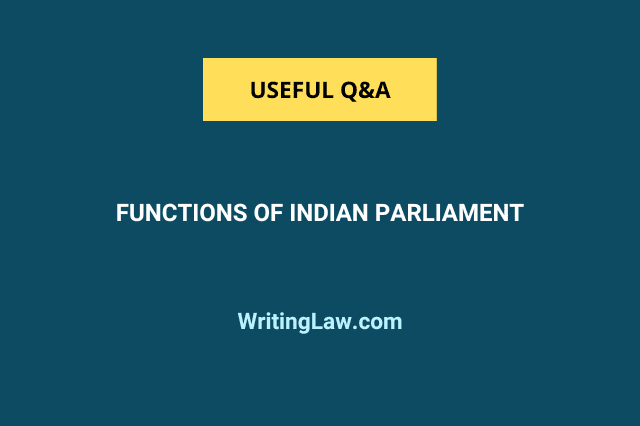
This law post talks about the five major functions of the Indian Parliament and explains each of them in brief.
Introduction
India is run by a Parliamentary form of government. The Parliament is the highest legislative body of India. It consists of three organs – the President, the Council of States (the Rajya Sabha) and the House of the People (the Lok Sabha). The President is regarded as an integral part of the Parliament even though he is not a member of either House of Parliament.
Further, the Parliament in India is not a sovereign body and has derived all its powers from the Constitution of India.
Powers and Functions of the Parliament of India
The functions of the Parliament are contained under Chapter II (Articles 79 to 122) of Part V of the Constitution.
Here are five major functions of the Indian Parliament:
1. Legislative Functions
The most important function of the Parliament is to make laws. The first step in the legislative process is the introduction of a bill. An ordinary bill, that is, a bill other than a money bill or financial bill, can originate in either House of Parliament. The bill, after both Houses pass it, becomes law only with the assent (consent or permission) of the Indian President.
Further, the money bill is only introduced in the Lok Sabha that too with the recommendation of the President.
Additionally, the Parliament enacts legislation on all the topics mentioned in the Union List and the Concurrent List (7th Schedule of the Constitution).
2. Executive Functions
The Parliament has the authority to discharge the cabinet from its office by a vote of no-confidence. In addition, it has the right to reject any law introduced by the cabinet, including budget proposals.
Further, the adjournment motion is only allowed in the Lok Sabha to bring the Parliament’s attention to any current topic of critical public importance.
3. Financial Functions
The Parliament has effective control over financial matters. For example, the amount to be spent for various government purposes is specified in the Union Budget. And the Union Budget is only passed after the assent of the Parliament. Also, even though the cabinet is in charge of collecting taxes from Indian citizens, the tax on anything cannot be imposed without first having an appropriate Act approved by the Parliament.
The Parliament also passes the Appropriation Bill and the Finance Bill. No money can be withdrawn from the Consolidated Funds of India unless the Parliament passes the Appropriation bill.
4. Electoral Functions
The Lok Sabha has the power to choose from its members to serve as its Speaker and Deputy Speaker. Similarly, the Rajya Sabha has the authority to elect the Deputy Chairman from among its members.
Further, the Parliament also has the authority to make laws related to elections in India. The Parliament also has the power to impeach the President, judges of the High Court and the judges of the Supreme Court.
Note: As per Article 54, the Electoral College elects the President of India, and as per Article 66, the Vice President is elected by the Electoral College along with members of both Houses.
5. Power to Amend
Any proposal for a constitutional amendment is made by Parliament. Either House of Parliament can introduce a bill for amendment.
Read Next:
1. Important Terms of the Parliamentary System
2. Is the Indian Parliament Supreme or the Judiciary (Supreme Court)?
3. The Withering State of Indian Parliamentary Democracy
- Understanding the Legislative Branch of the Indian Government - 6th May 2024
- Appointment, Oath, and Removal of Constitutional Posts in India - 28th April 2024
- Powers of Income Tax Authorities in India - 26th April 2024







